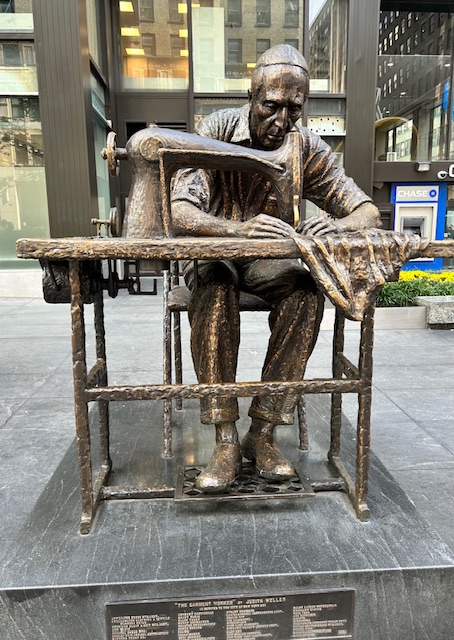A narrow garment shop bursts with rows of tie-dyed, African textiles and colorful Caribbean prints. A couple blocks down, a large textile warehouse treasures fabrics ranging from classic embroidery to mermaid sequins. On the street over, a vintage pop-up shop stuffed with washed denim, pearled dresses, and old lace pours out “Open Sesame” by Kool and the Gang as shoppers hunt for second-hand luxury finds from Zara, Ralph Lauren, and Tommy Hilfiger.
These stores reside in the Garment District, an area between W. 23rd and W. 40th Streets and Fifth and Eighth Avenues in Midtown South of Manhattan, known as the fashion hub of NYC. Small businesses coexist alongside larger chain names here, such as Mood and Nordstrom, but recent political policies have forced small businesses and consumers to reconsider and restrategize their business models and spending to adjust for nationwide tariff increases. “My business is the poor people business, not rich people business,” said Baig, owner of SB fashion, a small garment store on W. 27th St. “Poor people don’t have money right now. The tariff is going up. It is a problem for us, especially for us small business people.”
The threats to these businesses in Garment District intensifies as, “poor trade policies such as Trump’s tariffs are an added tax on consumers since purchases bought in stores and online are subject to these excessive import tax increases,” said Fashion Institute of Technology (FIT) Associate Professor Shawn Grain Carter. Carter is an expert on luxury branding and the retail industry and knows the hard-hitting and long-lasting effects these policies could have on the fashion industry in New York City.
Along with nationwide tariffs, the Garment District has also been recently impacted by the MSMX plan, a new rezoning policy approved by the Adams’ administration. The plan will lift the zoning laws from 1979 that protected garment manufacturers and proposes “high density, mixed-use zoning” for “delivering affordable housing, improving mobility, creating opportunities, and strengthening local services,” said Ydanis Rodriguez, New York City Department of Transportation Commissioner.
In short, this new rezoning law will allow housing and other properties to be built or used in the Garment District for commercial or personal use. These policies “could potentially disenfranchise fashion manufacturers in the area pertaining to exorbitant rent increases and/or displacement in the area,” said Carter. The impact is far reaching, not just for small businesses but chain and retail services as well, and has consumers and small businesses conflicted about what to do and where to buy.
Baig is worried about the impact Trump’s tariffs and the rezoning laws could have on his store and imports. “Manufacturers have no problem, they’re making for their country,” he said. “When the merchandise comes here, the problem starts here.” His business relies heavily on imported fabrics from countries such as Thailand, China, India, Pakistan, and Nepal, and specializes in American, African, and Caribbean style women’s garments.
Baig fears his business cannot compete with online shopping and does not have the funds for large advertising campaigns like larger chain stores do. “You see the stores are empty,” he said. He feels neglected by politicians, citing examples of issues that the mayoral candidates heavily focus on instead, including educational reform, housing affordability, and improving healthcare. “Anybody come, they are talking too much, but nobody helps with the small businesses,” Baig stated.
Not all of the upcoming mayoral candidates have explicitly stated their views on the rezoning policy approved by Adams, but Mamdani’s overall housing plan does focus on providing more rent stabilized housing instead of pro-development and rezoning in Midtown, while Cuomo’s campaign supports increasing the city housing supply.
DMZ Fashion and Fabrics is another small business on 38th St. that could be greatly impacted by the rezoning policy plan. Specializing in textiles from sequins to spandex to lace, owner Fred Mahrach has had to adjust his store’s business strategy after being affected by both international tariffs and the MSMX rezoning policies. With 90% of their garments imported from countries such as India, Pakistan, China, and Korea, “we actually took a loss just to not have customers leave…. we tried to work with the customers as much as we can,” said Mahrach.
He knows other businesses and friends that will personally be affected by the rezoning laws, and colleagues that will be forced to move out for the new mixed-zone usage. Despite drastic changes likely not occurring for a couple more years, he explained the domino effect of losing stores in the area to the new policies. “So, for other people to come and shop, they’re not going to go only for one store. Before the business dies, we have to find a solution right away,” Mahrach ended.
Even Mood fabrics, one of NYC’s leading fabric brands made international namesake by Project Runway, could be affected by the MSMX rezoning policies. “Less space means less production,” said Philip Sauma of Mood, who shares his concerns about the future of production in New York City in as little as two or three years.

Small businesses are not the only ones affected; the tariffs and policy changes will also hit FIT students the hardest, as increased prices and lack of sustainable garment options could affect their education. “I did just read that the 50% tariff on imports from India really completely broke our trust, because I think last year alone they did 87 billion dollars’ worth of goods. I know we get a lot of textiles and jewelry from them, so it’s interesting to see how it’s going to go down in the future,” said Brenna H., an FIT international trade and marketing student from Long Island.
As a fashion student, she’s mainly concerned with the 50% increase on Indian goods, especially on textiles and jewelry that are often imported into the US, but she also cares about issues like public safety. While admitting that Governor Hochul’s endorsement for Mamdani could influence her vote this November, she is more focused on her support of Mamdani’s core platform initiatives. “Trump was talking about bringing ICE into New York City and I know he (Mamdani) is really against that, and I think that’s super important,” she said.
Switching from shopping physically to online, Brenna H. is also acutely aware of how recent price hikes have affected her shopping habits. “I think when I buy internationally, I’m always just wary of costs because I know sometimes websites will put a disclaimer right away that the price that you see is included with the tariffs, but I know sometimes they can’t fully do that, so it kind of comes in at the end,” she said.
These hidden costs are a large reason consumers might cut businesses out of their shopping regimens. While Brenna has curbed her shopping habits and adjusted to the hiked prices by switching to online retail stores, like the UK brand ASOS, other students have been forced to cut out shopping from small businesses altogether.
“Pants that I could’ve bought before for $20 are more like $60 to $70 now,” said Sky Mencer, a student at City Tech, who admits to scaling down his consumer options due to recent price hikes. Mencer studies music, media, and marketing, and cares deeply about fashion and political expression, even sharing his values by wearing earrings inscribed with political slogans like, “my body, my choice.”
Mencer says he tries to be strategic with his shopping, often favoring thrift stores, neutral clothing he can pair with anything, and keeping purchases “within two digits.” He particularly likes Japanese streetwear fashion in parts of Flushing and wants to continue supporting smaller markets, but finds it difficult to prioritize sustainability over increasing costs.
In regard to the mayoral candidates, he said he, “hasn’t heard so many good things about Cuomo,” and does not have a strong preference toward any candidate. Despite Hochul’s endorsement for Mamdani, he isn’t swayed with his vote and has a general distrust regarding the candidates and political endorsements.
The ongoing battle between small businesses in the Garment District and the latest policy changes regarding tariffs and MSMX rezoning recontextualizes prominent issues the next mayor will have to navigate. “Any potential new mayor faces many economic challenges with respect to maintaining a vibrant fashion industry ecosystem,” said Carter. With political and social pressures mounting, it’s clear that small businesses and everyday consumers will be hit the hardest, constituents that the next NYC mayor cannot afford to alienate.


